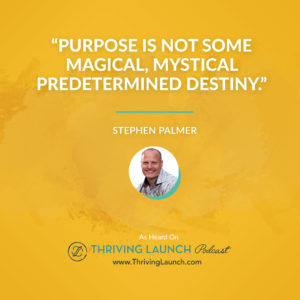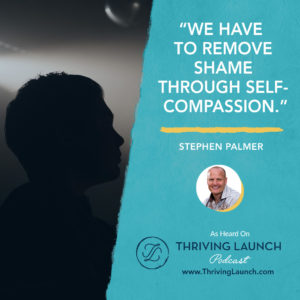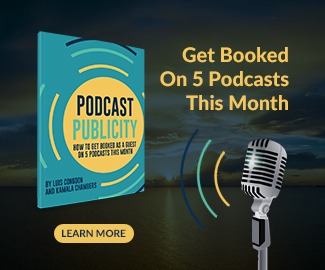Living With Purpose – Stephen Palmer
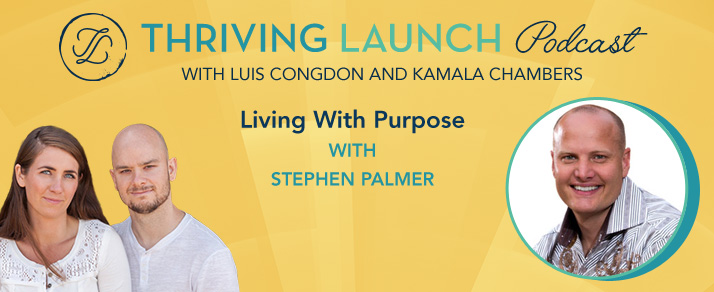
SUMMARY
Stephen Palmer, a New York Times best-selling author and a life-purpose coach, talks about stumbling blocks like those negative voices that tell us we are not good enough, and how we can get rid of those voices.
When we start feeling that we are good enough, then it is much easier to live our purpose.
KEY TAKEAWAYS
![]() We have to remove shame through self-compassion.
We have to remove shame through self-compassion.
![]() Purpose is not some magical, mystical predetermined destiny.
Purpose is not some magical, mystical predetermined destiny.
![]() People whose purpose is “wanting to change the world” don’t care about the world. They care about themselves.
People whose purpose is “wanting to change the world” don’t care about the world. They care about themselves.
![]() The word “purpose” comes from the old English which means to put forth an intention.
The word “purpose” comes from the old English which means to put forth an intention.
![]() Becoming self-aware is a lifelong process.
Becoming self-aware is a lifelong process.
![]() Self-compassion is not taught in our culture.
Self-compassion is not taught in our culture.
![]() The inner critic is shame, and shame prevents self-awareness.
The inner critic is shame, and shame prevents self-awareness.
![]() The Cognitive Dissonance is a principle that says our beliefs and our behaviors have to align. If they don’t, it creates discomfort for us.
The Cognitive Dissonance is a principle that says our beliefs and our behaviors have to align. If they don’t, it creates discomfort for us.
![]() Reprogram the false and negative beliefs you’ve had.
Reprogram the false and negative beliefs you’ve had.
![]() What you see out there in the world is a reflection of the movie you’re playing in your mind.
What you see out there in the world is a reflection of the movie you’re playing in your mind.
![]() We create our reality.
We create our reality.
TRANSCRIPTION: LIVING WITH PURPOSE – STEPHEN PALMER

Kamala Chambers
On this episode, we’re going to be talking about living with purpose and letting go of those little negative voices that tell us we’re not good enough.
Today, we’re here with a New York Times best-selling author and a life purpose coach Stephen Palmer.

Luis Congdon
Hey, Thriving Launchers, something Kamala and I are very passionate about is living with purpose and knowing what your purpose is. Once you find it, having that drive, edge, and force behind you that makes it so you can get out there and live it.
To help us find our purpose, figure out what stumbling blocks are so we can clear the road, get out there, be on fire, and learn to live with purpose, we brought on Stephen Palmer. He’s an author, a fantastic coach, and somebody we’ve already resonated with through his work, and through conversations.
So without further ado, Steven, are you ready to launch?

Stephen Palmer
I was born launched.

Luis Congdon
Love it.
I want to tell you guys, before the interview, we were talking with Steven, and he was saying finding your purpose isn’t the biggest deal here. The biggest deal is living with purpose. What are the roadblocks? He said finding your purpose is easy, but I want to start with that question because I think it’s important to ask.
Why is finding your purpose easy? Why do say that and why do you think that there’s something behind living with purpose that’s even more challenging?

Stephen Palmer
First and foremost, people don’t know what purpose is. That’s the single biggest misconception I see.
We have made the idea of purpose very like mystical. It feels like some predetermined destiny in the stars. It feels something we’re supposed to find, that was born in us and we’re always on the search for that one thing. My take is that doesn’t even exist. There’s no such thing.
True Meaning Living With Purpose

Stephen Palmer
The word “purpose” comes from the old English, and it means to put forth an intention. That’s what purpose means, and that means you, making a choice. So there’s no predetermined destiny. There’s nothing for you to find. There’s only an intention for you to set.
God puts seeds in our hearts, and too often, people are waiting for God to tell them what to do. They’ll say, “Well, I’ll live my purpose just as soon as God tells me what it is.” and God is saying, “Look. I already gave you everything you need. Now, what do you propose to do with your gifts?”

Stephen Palmer
Living with purpose is whatever you’re doing right now. If you don’t like it, change your purpose. There’s nothing to find. There’s nothing out there.
That’s why first and foremost, it’s easy to find because at the most basic level, living with purpose is simply you doing what you love to do. End of story.
Living With Purpose Is Not Supposed To Be Grandiose

Stephen Palmer
A lot of people think purpose is intended to be some grand life-changing thing. In fact, we use terms like “Wanting to change the world.” My take on has always been anybody who comes to me and says that they want to change the world, I know for a fact they’re not living with purpose. They don’t care about the world. They care about themselves. They have a deep hole in their souls that tells them they’re not enough, and they’re simply trying to fill that hole in their hearts.
For me, the image I use, the most basic elemental image I can give somebody to say “What is your purpose?” is a kid playing in the sandbox. You look at a kid playing in a sandbox or engaged in any play, and they’re wholly committed. They’re living entirely in the moment. They’re not thinking about the future, worried about what’s going to happen in the future. They’re not ruminating about the past. They’re wholly engaged at the moment. They’ve lost all track of time. They’re just in the flow, and that is living with purpose.
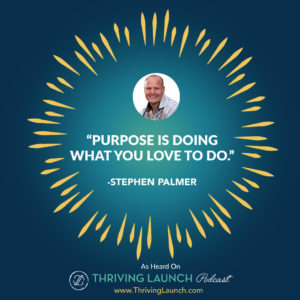

Stephen Palmer
It just so happens, we tend to put living with purpose on this hierarchy like Mother Teresa, Gandhi, and George Washington. Those are like guys at the top of this hierarchy of world-changing purposes.
Skateboarding, down here at the bottom is certainly not world-changing. So certainly, that can’t be a worthy purpose.
Look at Tony Hawk. The guy was born to be a skateboarder and look at how he’s changed the world. We love to watch him skateboard. You wouldn’t think to compare LeBron James or playing basketball to helping orphans in the streets of Calcutta like Mother Teresa did. Why do we pay LeBron James so much money? It’s because we love to watch him play, and he’s a kid playing in the sandbox.
People like Mother Teresa, who we put on a pedestal are just children playing in the sandbox too. It just so happens that those were the seeds planted in her heart. It’s not like her living with purpose is any more worthy than LeBron James, who plays basketball. It’s just that’s what she enjoyed doing.
Tendency To Put Living With Purpose On Hierarchy

Stephen Palmer
It just so happens, we tend to put living with purpose on this hierarchy like Mother Teresa, Gandhi, and George Washington. Those are like guys at the top of this hierarchy of world-changing purposes.
Skateboarding, down here at the bottom is certainly not world-changing. So certainly, that can’t be a worthy purpose.
Look at Tony Hawk. The guy was born to be a skateboarder and look at how he’s changed the world. We love to watch him skateboard. You wouldn’t think to compare LeBron James or playing basketball to helping orphans in the streets of Calcutta like Mother Teresa did. Why do we pay LeBron James so much money? It’s because we love to watch him play, and he’s a kid playing in the sandbox.
People like Mother Teresa, who we put on a pedestal are just children playing in the sandbox too. It just so happens that those were the seeds planted in her heart. It’s not like her living with purpose is any more worthy than LeBron James, who plays basketball. It’s just that’s what she enjoyed doing.
Living With Purpose Is Doing What You Love

Stephen Palmer
We can go into some depth in there, but I wanted just to make the point that first of all, you have to understand, living with purpose is just a kid playing in the sandbox. It’s you having fun, doing what you love.
In the ideal world, that means making a living doing what you love. Sometimes, that’s hard to do. Sometimes, it’s just a hobby we love, and that’s okay too. You don’t have to make a living doing it necessarily, but that’s the most elemental version of living with purpose.
And so, when the reason why people have a hard time finding and living with purpose is that they think that it’s some big world-changing destiny out there, and it’s just not. Living with purpose is just you being a kid in a sandbox playing, having fun, and losing all track of time.

Kamala Chambers
I appreciate the way you’re framing that. It makes the pressure release that we have to find this thing when living with purpose. We have to discover it every single day. Like, what is that big purpose we have in life?
One thing I know you talk about is feeling like you’re not enough and how that blocks us from finding and living what we’re supposed to be doing in our life, and setting that intention forward. I know that’s something I’ve struggled with a lot in my life. It was an old system that was put in at a very young age that “I’m not enough.” That’s held me back, and it’s something I keep coming up against.
What would you say to people that are struggling with that belief and how is that affecting them living with purpose?

Stephen Palmer
Here’s what I find. I’m glad you brought that up because that is the whole heart and soul of all the work I do.
Process Of Living With Purpose

Stephen Palmer
What I find is when people come to me trying to figure out what their purpose is, here’s the process I take them through.
The unspoken, subconscious premise or assumption of living with purpose is that nobody else can do what you do quite as you do it. Therefore, you’re doing something that is so valuable and important that the world will be the path to your door.
Why do you want that?
You want that because it makes you feel important, which tells me that if you are asking the question, “What is my purpose?” That’s not the real question. The real question when anybody says, “What is my purpose?” What they’re saying is, “I currently don’t feel valuable, valued, and important. I want to feel like I matter and I don’t feel like that.” That’s what they’re trying to get.
If they had this idea of living with purpose, it would mean, “I’m doing the thing that’s so important to the world that everybody would love what I do.”
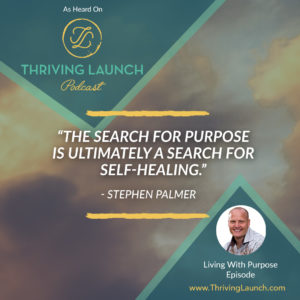
The Not Enough Wound In Living With Purpose

Stephen Palmer
It’s a search to feel like you are enough, and where that comes from is this universal the “not enough” wound. I have coached with hundreds of people, and I have yet to find a single person who doesn’t have some unique form of a “not enough” wound.
Like you said, it happens when we’re children, typically comes from parents or it can come from peers or teachers. We get wounded in our childhood that gives us some fundamental sense of brokenness, deficiency, inadequacy, or unworthiness, and that’s whole deal.
That’s how we self-sabotage because that “not enough” wound gives us our fears, frustrations, anxieties, and all of the things that make us afraid living with purpose in a big way. It’s not about finding and living with purpose. It’s about healing that “not enough” wound.
You heal the “not enough” wound and purpose takes care of itself.

Kamala Chambers
So my question is how do we heal the not enough wound?
For me, it takes practice. Every time that old story comes up, it takes practice and making a new choice, and it’s been an ongoing journey working with that within myself.
I’d love to hear some tips on how you recommend us healing that wound so we can move forward living with purpose.

Stephen Palmer
To fully adequately answer that question would take us hours, days, and weeks even but in a general sense, it’s about self-awareness.
Heal The “Not Enough” Wound To Start Living With Purpose

Stephen Palmer
How do we cultivate self-awareness? It’s through mindfulness.
I teach people a process of mindfulness, which is very particular methodology using meditation as a way to become self-aware. That’s the simplistic answer.
In a general sense, the big answer is you have to do the inner work. You have to go inside yourself first.
Living With Purpose And Becoming Self-Aware

Stephen Palmer
In fact just today, I had a coaching call with a brand new client. It was his first call, and he came to me because he was frustrated in his career. He came to me wanting tips for a career change.
I went through this same thing with him, and I said, “Look, you got to do the inner work first. It’s not about a career change. You have to do the inner work first. You have to go inside yourself. You have to figure out, why do I behave this way? Why am I frustrated? Why am I anxious? Why do certain things trigger me emotionally?”
And so, it’s just a lifelong process of becoming self-aware, and that comes through the work of mindfulness.
Living With Purpose And Self-Compassion

Stephen Palmer
Another important part of this is self-compassion.
With the “not enough” wound, what always 100% of time accompanies it is the inner critic. That’s the inner voice in your head that’s always beating you up every time you make mistakes. It’s the voice that says “How could you be so stupid? You make the same mistake over and over again. When are you ever going to learn?”
We all have that inner critic, and that comes from that “not enough” wound. You have to replace that inner critic with the voice of self-compassion, and that’s hard for people to do.
Self-compassion is not taught in our culture, and so, it becomes a very hard habit to break.
Inner Critic Is Shame That Hinders Living With Purpose

Stephen Palmer
The reason why that inner critic is such a big deal is that it is shame. The reason why shame is a big deal is that it prevents self-awareness.
As long as we’re looking at ourselves through the lens of shame, the story is always going to be, “I did what I did. I behaved the way I behaved because I’m not good enough,” “Because I’m not smart enough,” “Because I’m stupid.” That’s the voice of shame, but you do not see the underlying unmet needs and deep emotional wounds that you have.
It’s not so much that shame is like morally wrong. It’s just that it prevents self-awareness.

Stephen Palmer
We all have this deep wound in our hearts, and you have to go inside and navigate that, and it’s challenging and painful. It’s opening up those wounds that we thought we’ve dealt with. They’re subconscious. They’re so deeply embedded. They’re affecting every single decision we make in our lives.
It feels like reopening a wound, and we don’t want to go into that, but that’s exactly what we have to do. And so, there has to be lots and lots of self-compassion in that process.

Kamala Chambers
I love that. It’s been an important part of my journey.
Before we close, I want to get into a little bit about self-sabotage and how we sabotage ourselves from living with purpose.

Stephen Palmer
Yeah. I can make that personal.
Self-Sabotage Stops Us From Living With Purpose

Stephen Palmer
In a general sense, we’re calling the “not enough” wound the source of self-sabotage but everybody has their kind of unique flavor or form of it.
In my case, one of my core things is “nobody values what I have to offer.” That’s always been a very deep core wound of mine. It’s a long story, and I don’t need to bore you with all of my childhood traumas.
I grew up number 11 of 13 children in a very dysfunctional family, pretty abusive father. It was rough and painful. Everybody has their story, and there are lots of people who had it worse than me, but that’s my story. That’s my wound. It is what it is.
So for me, I always felt lost in my family. I felt like nobody listens to me, nobody understands me, and nobody values what I have to offer.
Cognitive Dissonance Principle In Living With Purpose

Stephen Palmer
There’s a principle in psychology called cognitive dissonance, which says that our beliefs and our behaviors have to align. If they don’t, then it creates a lot of discomfort for us. We’re hard wired such that we can’t live that.
If we have a belief that conflicts with the behavior, either, we have to align the belief with the behavior or change the behavior to align with the belief. It’s just how we’re hardwired.
We create these false beliefs about ourselves. In my case, that belief is “nobody values what I have to offer.” Because of minds are hardwired to make that real because of cognitive dissonance. Therefore, I will move heaven and earth to make that belief true.
Living With Purpose And Reprogramming Beliefs

Stephen Palmer
Therefore, if I have a belief “nobody values what I have to offer,” how in the world could I possibly ever put an offer out for coaching? Because my belief is nobody values what I have to offer. So I’m never as long as that’s my belief, going to put an offer out into the world and say, “Hey. This is what I have to offer.” Why would I do that when I believe nobody values what I have to offer?
I can’t do that because of cognitive dissonance. In that case, I change the belief, or I never put out an offer in the marketplace to match for my behavior and my belief to make the belief true. So you have to reprogram those beliefs.

Luis Congdon
What you’re saying Steven is powerful to me. It’s something that resonates with me. It’s something I’ve studied through neuro linguistic programming and cognitive behavioral therapy.
Start Living With Purpose Internally

Luis Congdon
Everything in life tells us that your external world is a match of your internal thoughts and what you’re thinking or put in another way. What you see out there in the world is a reflection of the movie that you’re playing in your mind.

Stephen Palmer
That’s right.

Luis Congdon
If you want to change the movie, you need to change the film, which means you need to go into your mind. You broke that down in a powerful way. It was incredible to hear that, and we have a variety of episodes.
We had an episode with Kristin Neff where she came on, and she talked about self-compassion and self-understanding. That’s an important one that I enjoyed from this interview how critical that self-understanding is.
I also enjoyed that word, “Cognitive Dissonance.” It comes from therapy. It’s a crucial one for everyone to understand. If your thoughts and beliefs about yourself don’t match the desire and goals you want, no matter how much action you’re doing, your action will never get you the results. It’s because your mind will find a way to sabotage it.

Stephen Palmer
That’s exactly right. It’s how we’re built.
The Power To Start Living With Purpose

Stephen Palmer
Here’s the thing. It’s both a source of self-sabotage, but it’s also a source of power.
We are programmed to create our reality. We create our reality. If we believe we’re dumb, we will create the reality. Everything we see in our life is evidence to support that belief, which means we have the power to create our reality.
Seeing the self-sabotage is a source of empowerment because we see, “I’m the one who has created this. Therefore, I have the power to change it and create a new reality.”

Kamala Chambers
Stephen Palmer, this has been amazing having you on the show. We’ve been talking about living with purpose but deeper than that. We talked about getting rid of self-sabotage and starting to feel we’re enough.
I just encourage you all to go out and take one of the nuggets that you got from this episode today, and find a way to apply it to your life.
Keep thriving everyone.

